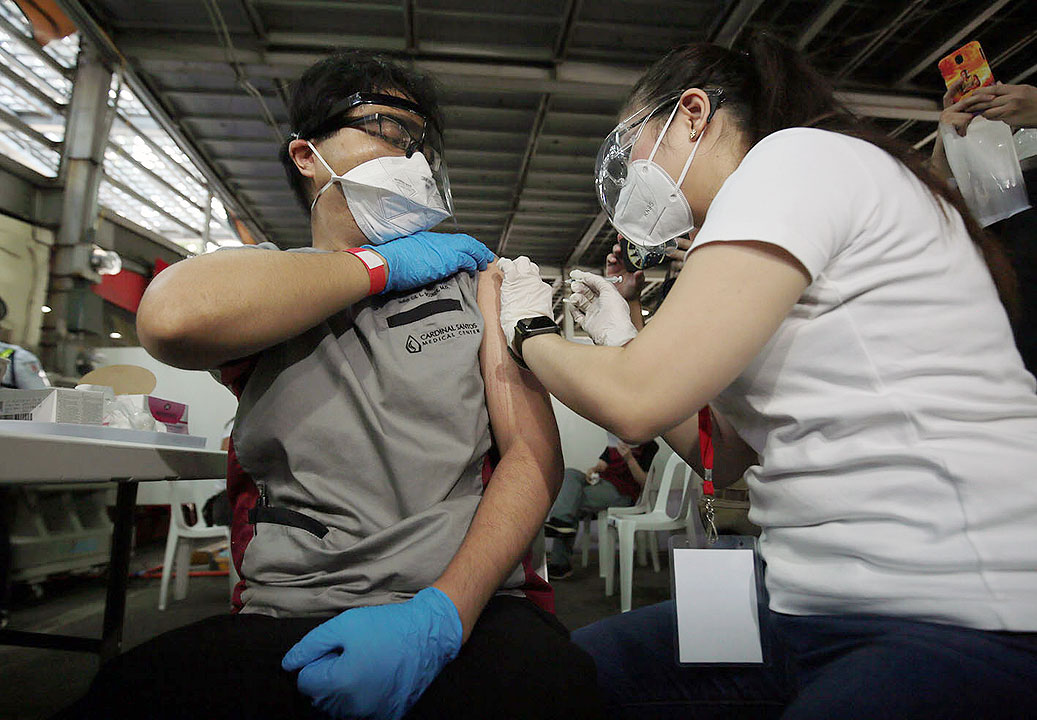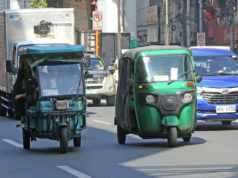Philippines logs 18,000 new COVID-19 infections

PHILIPPINE health authorities reported 18,012 coronavirus infections on Tuesday, bringing the total to 2.12 million.
The death toll rose to 34,498 after 161 more patients died, while recoveries increased by 18,945 to 1.93 million, the Department of Health (DoH) said in a bulletin.
There were 158,637 active cases, 92% of which were mild, 3.4% did not show symptoms, 1.4% were severe, 2.49% were moderate and 0.7% were critical.
The agency said 35 duplicates had been removed from the tally, 28 of which were tagged recoveries, while 105 recoveries were reclassified as deaths. Thirteen laboratories failed to submit data on Sept. 5.
Data from the Health department showed that 79% of intensive care units in the country had been used, while 80% of COVID-19 dedicated beds were occupied. It added that 63% of the country’s mechanical ventilators had been used.
The agency said 14 of 32 coronavirus referral centers in the country were at critical risk level in terms of use.
As of Sept. 5, the Research Institute for Tropical Medicine in Muntinlupa City and Amai Pakpak Medical Center in Marawi City were fully occupied.
It said 99% of Southern Philippines Medical Center in Davao City and 96% of the National Kidney Transplant Institute and Lung Center of the Philippines in Quezon City and Baguio General Hospital and Medical Center had been occupied.
The use rate was also above 85% in Quirino Memorial Medical Center in Quezon City, Philippine General Hospital in Manila, Batangas Medical Center, Jose B. Lingad Memorial Regional Hospital in Pampanga, Dr. Paulino J. Garcia Memorial Research and Medical Center in Cabanatuan, Dr. Jose N. Rodriguez Memorial Hospital in Caloocan and Cagayan Valley Medical Center.
The presidential palace on Tuesday said granular lockdowns in the capital region had been deferred.
Metro Manila would remain under a modified enhanced community quarantine until Sept. 15 or until the pilot targeted lockdowns are enforced, presidential spokesman Herminio L. Roque, Jr. said in a statement.
Indoor and al-fresco dine-in services, personal care services including beauty salons, beauty parlors and nail spas would remain prohibited, he said.
Immediate family members would be allowed to attend necrological services, wakes, inurnment and funerals as long as the deceased died of non-COVID-19 causes.
“However, they need to show satisfactory proof of their relationship with the deceased and have to comply with the minimum public health standards,” Mr. Roque said.
Earlier on Tuesday, the palace failed to detail the guidelines for the pilot-testing of localized lockdowns in Manila, the capital and nearby cities despite the scheduled enforcement on Sept. 8.
The guidelines were still being discussed, presidential spokesman Herminio L. Roque, Jr., told a televised news briefing. Further details on the lockdown strategy would be released once they become available.
The National Government has said the new lockdown strategy would give Metro Manila mayors more flexibility to contain the coronavirus.
Health Undersecretary Maria Rosario S. Vergeire earlier said localized lockdowns would help the government focus its pandemic efforts on high-risk areas.
The OCTA Research Group from the University of the Philippines has raised concern about the strategy.
There is no evidence to prove that granular lockdowns could address a widespread community transmission, it said.
Regional coronavirus lockdowns have been costly for the Philippine economy, which was now expected to grow less than expected after Metro Manila was placed under an enhanced community quarantine last month amid a fresh surge in infections caused by a more contagious Delta variant.
Mr. Roque has said the enhanced community quarantine might not be enough and the government must come up with a new strategy to contain the virus.
Meanwhile, the Philippine Chamber of Commerce and Industry (PCCI) pushed for the full reopening of the economy regardless of whether it achieves herd immunity against the coronavirus.
In a statement, the country’s largest business group said a 50-100% target inoculation of the country’s populations seemed elusive.
PCCI acting President Edgardo G. Lacson praised the move to granular lockdowns in places with high infection rates, which he said would allow both essential and nonessential businesses to operate.
But he said some health experts think it was impossible to achieve herd immunity amid the mutation of the virus and slow vaccine rollout.
“The COVID-19 virus and its variants will be here forever but it can be contained by simply observing prescribed health protocols of masking, handwashing and social distancing,” Mr. Lacson said.
He said the country should continue vaccination, testing and contact tracing efforts. “It must be recognized by authorities that a lockdown, whether region-wide or granular, remains disruptive and a disincentive to business operations.”
Only 13% of the population was fully vaccinated, the Johns Hopkins University COVID-19 tracker showed.
A study published in the Journal of Infectious Diseases in November found that region-wide mitigation strategies such as stay-at-home orders were linked to lower COVID-19 transmission rates.
The Mayo Clinic said achieving herd immunity through vaccination had become difficult because of uneven vaccine rollouts, vaccine hesitancy and questions on how long the shots protect people against the virus as new variants emerge. — Kyle Aristophere T. Atienza and Jenina P. Ibañez



